Flemyng Surname Ancestry ResultsOur indexes 1845-1865 include entries for the spelling 'flemyng'. In the period you have requested, we have the following 9 records (displaying 1 to 9): Buy all | | | Get all 9 records to view, to save and print for £36.00 |
These sample scans are from the original record. You will get scans of the full pages or articles where the surname you searched for has been found. Your web browser may prevent the sample windows from opening; in this case please change your browser settings to allow pop-up windows from this site. The Edinburgh Gazette
(1846)
The Edinburgh Gazette is the official publication in which various Scottish legal notices are issued, as well as promotions and casualty lists for the British army as a whole, and brief lists of English bankrupts. The key source for tracing details of Scottish bankruptcies, insolvencies, and dissolutions of business partnerships.FLEMYNG. Cost: £6.00.  | Sample scan, click to enlarge
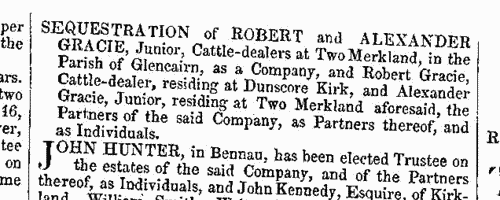
|  Staff of the House of Correction at Westminster
(1851) Staff of the House of Correction at Westminster
(1851)
The 1851 census enumerators' books for the mass of the population record the information as in this sample scan. However, there were also separate books for the major public institutions. The instructions for the first column (Name and Surname of each Person who abode in the Institution on the Night of the 30th March, 1851) run: "Write after the Name of the Master or Head of the Institution the Names of his Wife, Children, other Relatives, and Servants; then the Names of the Officers, their Families, and Servants. Commence the list of Inmates for which the Institution is provided on another page." For the second column (Position in the Institution): "State whether the person is the Head, or an Officer or Servant, or the Wife, Son, Daughter, or other relative of such Officer or Servant. If an Inmate, state whether patient, soldier, scholar, &c." For the third column (Condition): "Write 'Married,' 'Widower,' 'Widow,' or 'Unmarried,' against the Names of all Persons except Young Children." For the fourth column (Age (last Birthday)): "For Infants under One Year state the Age in Months, writing 'Under 1 Month,' '1 Month,' '2 Months,' &c." For the fifth column (Rank, Profession or Occupation): "State here the profession, or what is believed to have been the ordinary occupation of the Inmate before admission into the Institution. Carefully distinguish in this column the different kinds of 'laborers,' and those who have been masters in trade from others." For the sixth column (Where Born): "Opposite the Names of those born in England, Scotland, or Ireland write the County, and Town or Parish. If born in the British Colonies, the East Indies, or in Foreign Parts, state the Country; in the last case, if a British Subject, add 'British Subject.'" For the seventh column (Whether Blind, or Deaf-and-Dumb): "Write 'Deaf-and-Dumb,' or 'Blind,' opposite the Name of the Person.'" The House of Correction of the City of Westminster was in the parish of St Margaret and the ecclesiastical district of St Stephen's; in Westminster superintendent registrar's district, and St Margaret registrar's district. There were 21 officers, 8 members of their families, and 6 servants; the institution held 737 prisoners - 245 men and 492 women. HO 107/1480
FLEMYNG. Cost: £2.00.  | Sample scan, click to enlarge

| Traders and professionals in London
(1851)
The Post Office London Directory for 1851 includes this 'Commercial and Professional Directory', recording about 80,000 individuals. FLEMYNG. Cost: £4.00.  | Sample scan, click to enlarge

| British Army Officers
(1853)
The 14th volume of the New Annual Army List, for 1853, corrected to 30 December 1852, was published by Major H. G. Hart of the 49th Regiment. It contained 'the dates of commissions, and a statement of the war services and wounds of nearly every officer in the Army, Ordnance and Marines'. The first section, pages 1 to 111, lists officers of the rank of major and above in order of rank and precedence; officers with local rank (112-114); Yeomen of the Guard (115); the Honourable Corps of Gentlemen-at-Arms (116); Headquarters Staff (117); and then (as in the scan) all the regiments and units in order of precedence, giving any regimental honours, with all the officers by rank, and details of postings, facings and agents (118-336). A long section (337-426) then lists officers on the retired full pay and half-pay, including the Royal Regiment of Artillery, Corps of Royal Engineers, Royal Marines and military departments. Then there are lists of officers in the Commissariat Department, the Medical Department, Veterinary Surgeons and the Chaplains Department. A section of Officers on the Foreign Half-Pay gives lists for the German Legion and Miscellaneous Corps (Brunswick Cavalry, Brunswick Infantry, Chasseurs Britanniques, Royal Corsican Rangers, Dillon's Regiment, Greek Light Infantry, Royal Malta Regiment, Meuron's Regiment, Roll's Regiment, Sicilian Regiment, Watteville's Regiment, York Light Infantry Volunteers, the Foreign Veteran Battalion, and the Foreign Corps of Waggoners). After lists of officers in garrisons and military establishments, there are sections listing officers holding Gold Decorations for their parts in various important actions and other British decorations, and those holding medals bestowed by foreign powers. FLEMYNG. Cost: £4.00.  | Sample scan, click to enlarge
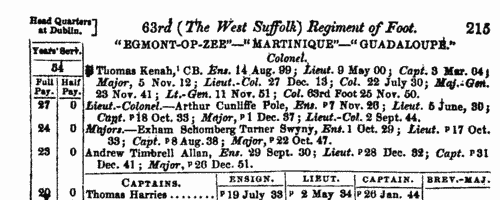
| Traders and professionals in London
(1856)
The Post Office London Directory for 1856 includes this 'Commercial and Professional Directory', recording over 100,000 individuals. FLEMYNG. Cost: £4.00.  | Sample scan, click to enlarge

| Officers of the British Army
(1860)
The New Annual Army List first lists officers of the rank of major and above, by rank, and with dates of appointment to each successive higher rank, and (where appropriate) when placed on half pay. An asterisk indicates temporary rank; a superscript p shows that a commission was purchased; a dagger shows officers on the half pay of their last regimental commission. An ornate W indicates those officers actually present in any of the actions of 16, 17 or 18 June 1815 and therefore awarded the Waterloo Medal; P is put before the name of an officer who served in the Peninsula or the South of France; T for the Battle of Trafalgar; VC for the Victoria Cross. For each officer in this section, the final column notes his then present or immediately former regiment and/or office, if any. Next, all the officers of the army are listed, down to the rank of ensign, by regiment or corps, giving rank, name, date of rank in the regiment, and date of rank in the army, with occasional further notes. Again, holders of medals are duly noted, as in the first list. For each regiment the paymaster, adjutant, quartermaster, surgeon and assistant surgeons are named, as well as the civilian agent; and the regimental motto, battle honours, and colours of the facings and lace of the dress uniform are stated. After the British regiments of the line, the Rifle Brigade, the officers of the West India infantry, the Ceylon rifles, the Cape Mounted Riflemen, the Royal Canadian Rifles, St Helena Regiment and the Gold Coast Artillery Corps are given; then the officers of the garrisons and other military establishments; the Royal Artillery; Royal Engineers; Royal Marines; Commissariat Department; Medical Department; Staff Officers of Pensioners; Chaplains' Department; Staff (of Great Britain, Australia, Bahamas, Bermuda, British Columbia, Cape of Good Hope, Ceylon, East Indies, Falkland Islands, Gibraltar, Heligoland, Hong Kong, Ionian Islands, Jamaica (including Honduras), Malta, Mauritius, Newfoundland, North America, St Helena, the Western Coast of Africa, and the Windward and Leeward Islands); Military and Civil Department; and Barrack Masters. Then there is a separate list of officers retained on retired full pay and half pay (including the German Legion, the Brunswick Cavalry, the Brunswick Infantry, Chasseurs Brittaniques, Royal Corsican Rangers, the Greek Light Infantry, Royal Malta Regiment, Meuron's Regiment, Roll's Regiment, Sicilian Regiment, Watteville's Regiment, the York Light Infantry Volunteers, Foreign Veteran Battalion and the Foreign Corps of Waggoners).FLEMYNG. Cost: £4.00.  | Sample scan, click to enlarge
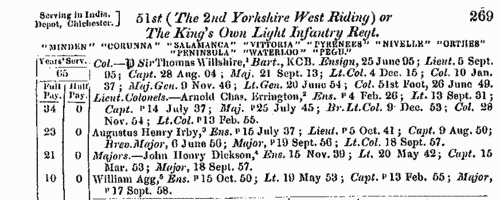
| Boys entering Cheltenham College
(1861)
Cheltenham College 'was founded in order to provide for the sons of gentlemen a Classical, Mathematical, and General Education of the highest order, on moderate terms, in strict conformity with the principles and doctrines of the Church of England.'
Andrew Alexander Hunter, the college registrar, compiled the first edition of the College Register in four parts from 1883 to 1886: these merely listed the boys by term of entry, with their dates of birth and names and addresses of their fathers. Circulars were also sent out to all Old Cheltonians whose addresses were known, requesting additional details. On the basis of the returns from these and Hunter's further researches, this much fuller register was published in 1890.
The information after each boy's name is given (where known and applicable) in this format: father's full name and address as of the time the boy entered the college; class and department on entering the college (classes being number from 1 downwards, and these again divided into A and B, some into C and D, others into P (Principal's side) and V. P. (Vice-Principal's side) - 1A was the highest class in each department: besides this, certain others were called Addiscombe, Woolwich, Civil, Direct, Line, Sandhurst, Naval, Special, Preparatory, Latin, and India Civil) and the same on leaving, name of Boarding House (or 'Day Boy'), scholastic and athletic honours attained at the college, and subsequent career (including date and place of death, or present address in 1890, if known).FLEMYNG. Cost: £4.00.  | Sample scan, click to enlarge
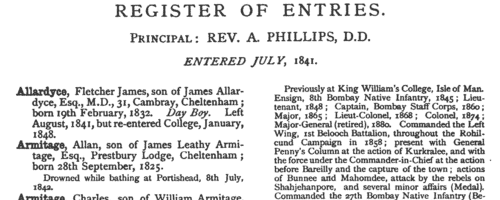
| Boys entering Loretto School
(1862)
The Reverend Dr Thomas Langhorne, who came to Musselburgh in Midlothian as an Episcopalian Church clergyman, established a small school for boarders and day scholars at Loretto House, so called because the grounds contained the ruins of the mediaeval chapel of St Mary of Loretto. To celebrate the centenary of the school in 1925, a second edition of the school register was published, edited by A. H. Buchanan-Dunlop. Relatively little was known of many of the earliest scholars, but from 1835 onwards the register generally gives full name, in capitals, surname first; date of birth; period of time at Loretto; a brief biography; date of death; whether brother of any other boy in the register; and a sequential number. FLEMYNG. Cost: £4.00.  | Sample scan, click to enlarge
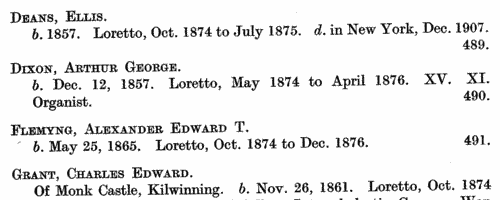
| Dublin Electors
(1865)
This alphabetical list of electors for the City of Dublin for 1865 is annotated with details of the votes cast in the election of 15 July 1865 for a member of Parliament. The candidates were John Vance, Esq., D. L. (V), Benjamin Lee Guinness, Esq., D. L., LL. D. (G), and Jonathan Pim, Esq. (P). The first column gives, in bold, the initial of the ward in which lay the property that was the elector's qualification. The second column gives the elector's sequential number (alphabetically) within that ward. Then the elector's full name is given, surname first, and address, usually including house number. The votes cast are shown on the right: where these columns are blank, the elector did not vote. The key to the ward names is: A, South Dock; B, Donnybrook; C, Rathdown; D, Trinity; E, South City; F, Royal Exchange; G, Mansion House; H, Fitzwilliam; I, Wood Quay; K, Merchants' Quay; L, Usher's Quay; M, Arran Quay; N, Inns' Quay; O, North City; P, Rotundo; Q, Mountjoy; R; North Dock. S indicates the register of freemen.FLEMYNG. Cost: £4.00.  | Sample scan, click to enlarge
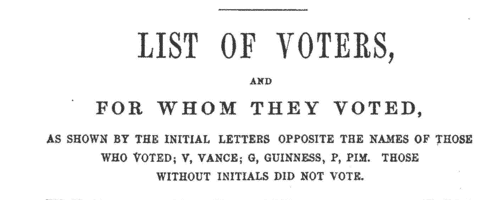
|
Research your ancestry, family history, genealogy and one-name study by direct access to original records and archives indexed by surname.
|












